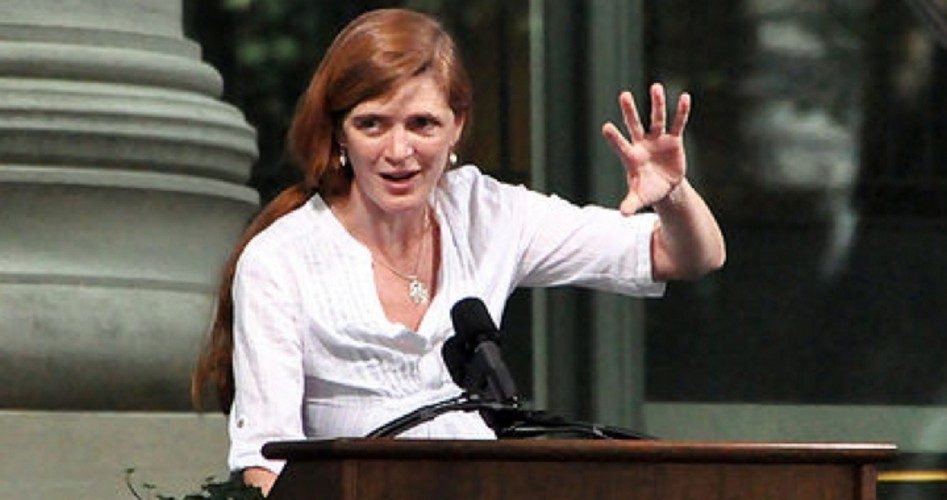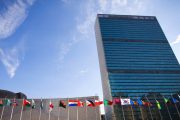
On September 11, the United Nations reasserted that it believes it has the exclusive and undeniable right to determine when a people is worthy of sovereignty and when the UN must step in and rule for them.
At an informal meeting of the General Assembly, UN Secretary-General Ban Ki-moon declared the international body’s continuing commitment to protecting populations of member states from suffering under regimes that fail to “fulfill their obligations under the rule of law.” This includes Syria, Libya, and anywhere else in the world that isn’t toeing the one-world-government line.
Societies, said Ban, must “embrace diversity” or face the intervention of regional and international bodies that will step in to “protect and empower” the people living under the offending regime.
In order to impose its will and enforce its vision of “diversity,” the UN will prevent the governments of member states from passing laws, programs, and policies that prohibit the establishment of a UN-approved body of law.
Preventing governments from opposing the UN is a significant step toward the achievement of the UN’s ultimate aim: permanent aggregation of all national sovereignty into one global entity under the rule of globalists bureaucrats. Ban addressed this issue in his statement on September 11:
Prevention may sound abstract, but it is very concrete and specific. It means, among many things, that States translate obligations and standards set out in international law, notably international humanitarian and human rights law, into policies, programmes, laws and institutions that protect and empower their people.
This principle underlying this drive to force nations to, as U.S. UN Ambassador Samantha Power (shown) said, give up a “pinch of sovereignty” in exchange for the United Nation’s version of peace and prosperity is known as Responsibility to Protect (R2P).
Power, it must be noted, played a significant role in the development of R2P. Her influence on President Obama and his nationally televised address on Syria was recognized by National Review Online. “This was a Samantha Power speech,” wrote Stanley Kurtz, referring to President Obama’s call for American intervention in Syria.
Americans committed to the maintaining our Republic, our Constitution, and our right to determine our own laws, regulations, and policies must become familiar with the Responsibility to Protect doctrine and the extraordinary lengths the UN will go to to impose its provisions.
In an address given in last September, the UN secretary-general promoted the global shadow government’s ultimate goal of eradicating national sovereignty by way of the R2P policy.
Agreed to by the UN General Assembly at a summit of world leaders in 2005, R2P purports to grant the global government power to decide whether individual nations are properly exercising their sovereignty.
UN literature describes R2P as the concept that holds “states responsible for shielding their own populations from genocide, war crimes, ethnic cleansing, and related crimes against humanity and requires the international community to step in if this obligation is not met.”
That is to say, if the UN determines that a national government is not voluntarily conforming to the UN’s idea of safety, then the “international community” will impose its will by force, all for the protection of that nation’s citizens.
Lest anyone believe that the globalists at the UN are simply pacifists whose desire is to meekly encourage regimes to treat their people kindly, Secretary-General Ban Ki-moon took a more forceful posture at the conference held at the UN headquarters in New York:
We all agree that sovereignty must not be a shield behind which States commit grave crimes against their people. But achieving prevention and protection can be difficult. In recent years, we have shown how good offices, preventive diplomacy, mediation, commissions of inquiry and other peaceful means can help pull countries back from the brink of mass violence.
However, when non-coercive measures fail or are considered inadequate, enforcement under Chapter VII will need to be considered by the appropriate intergovernmental bodies. This includes carefully crafted sanctions and, in extreme circumstances, the use of force.
Chapter VII of the UN Charter authorizes the Security Council to use force in the face of a threat to peace or aggression, taking “such action by air, sea, or land forces as may be necessary to maintain or restore international peace and security.” As there is currently no UN military, all such interventions are carried out by the national armed forces of member nations.
Faithfully, the United States, as the chief financial engine of the international body, has not only signed on to promote the Responsibility to Protect scheme, but President Obama has established a federal agency to ensure that it is executed effectively.
The agency is the White House Atrocities Prevention Board (APB), which was headed by Samantha Power until she was confirmed as the U.S. ambassador to the UN.
Exercising the powers he created for himself in Executive Order 13606, President Barack Obama demonstrated his support for the R2P program when he established the Atrocities Prevention Board.
The stated goal of the APB is to first formally recognize that genocide and other mass atrocities committed by foreign powers are a “core national security interest and core moral responsibility.”
Apart from the unconstitutionality of this use of the executive order, there was something sinister in the selection of Samantha Power to spearhead the search for atrocities.
One source claims that the very existence of the APB is due to Power’s own persistence in convincing the White House that discovering atrocities should be a “core national-security interest and a core moral responsibility of the United States.” The statement released at the time of the signing of the executive order demonstrates Power’s remarkable power of persuasion.
Samantha Power rose to prominence in government circles as part of her campaign to promote the Responsibility to Protect scheme.
Responsibility to Protect is predicated on the proposition that sovereignty is a privilege, not a right, and that if any regime in any nation violates the UN-approved code of conduct, then the international community is morally obligated to revoke that nation’s sovereignty and assume command and control of the offending country.
The three pillars of this UN sovereignty grab explain the provenance of this presumed prerogative:
1. A state has a responsibility to protect its population from mass atrocities;
2. The international community has a responsibility to assist the state if it is unable to protect its population on its own; and
3. If the state fails to protect its citizens from mass atrocities and peaceful measures have failed, the international community has the responsibility to intervene through coercive measures such as economic sanctions. Military intervention is considered the last resort.
It is the habitual recourse to this purported “last resort” that has cost countless American lives and has propelled our Republic closer to becoming a mere regional administrative unit of the global government of the United Nations. This has been borne out in Mali, Libya, the Ivory Coast, and now, in Syria.
Using history as a guide, Americans know that the pseudo-pacifists running the United Nations believe that if the social contract fails, there’s always the option of deploying blue-helmeted soldiers to impose “peace” at the point of a gun.
To that end, Special Advisor of the Secretary-General on the Prevention of Genocide Adama Dieng recommended delegates work in their individual governments to contribute to an armed UN force under the command of the global government. Reciting the third point of R2P, Dieng pushed for more powerful tools to carry out the third pillar. “It is our collective responsibility to study the implications of the use of each of them, and to understand the conditions under which the potential of each tool can be maximized,” Dieng said. “It is also our responsibility to establish and strengthen the structures that will make third-pillar tools actionable and effective.”
No matter the frequency or ferocity of the moral outrage spewed by internationalists, the government of the United States does not have a constitutional responsibility to protect the citizens of the world from atrocities.
And nowhere in the Constitution is the president or Congress authorized to place the armed forces of the United States under the command of international bodies, regardless of treaty obligations or sovereignty-stealing “responsibilities” to the contrary.
At the September 11 meeting of the General Assembly, Deputy Secretary-General Jan Eliasson echoed his boss’s call for intervention in Syria. “Everybody has a role to play. Nobody can do everything; and everybody can do something,” Eliasson said. “We pay an enormous price for waiting for conflicts to get worse,” he added.
Eliasson unwittingly gave Americans sound advice.
We all can do something, and the first thing we should do is immediately demand that our elected representatives support legislation that would get the United States out of the United Nations and get the United Nations out of the United States.
If we fail to do this, we will indeed pay an “enormous price” and the UN’s attacks on our sovereignty will only get worse. How long until the UN decides that the Bill of Rights (principally the freedom of religion and the right to keep and bear arms) is a violation of humanitarian law and send international forces to demand that those rights be suspended in the name of the responsibility to protect?
We must act now.
Joe A. Wolverton, II, J.D. is a correspondent for The New American and travels frequently nationwide speaking on topics of nullification, the NDAA, and the surveillance state. He can be reached at [email protected]



